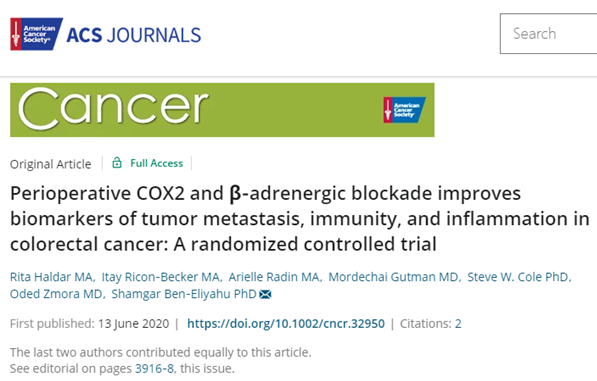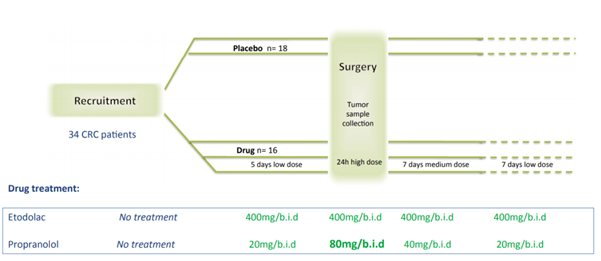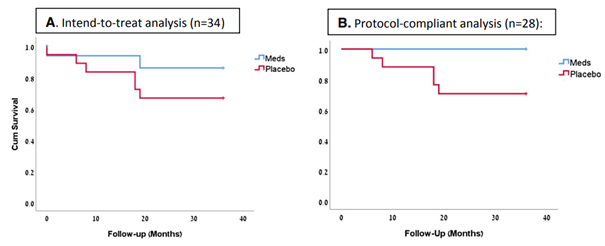Human emotions often affect the progression of the disease, especially for cancer.
Bad emotions and stress will not breed cancer, but they will make cancer grow faster.
Because these mental activities produce a lot of hormones such as prostaglandins and catecholamines, these hormones inhibit the activity of immune system cells and indirectly increase the risk of cancer metastasis.
Even these hormones help the tumor cells remaining after cancer surgery develop into life-threatening metastases.
Some researchers pointed out in an article published in "Cancer" that cancer patients need immunotherapy to reduce inflammation and physical and mental stress, which is of great significance for preventing cancer metastasis.
△ The research trial was published in "Cancer" magazine
01. Psychological burden such as high pressure may aggravate tumor metastasis
When people are under great pressure and mood changes, they will affect the changes in hormone levels, and this is also true for cancer patients.
Different from normal people, these psychological stresses such as fear, anxiety, tension, and emotional loss not only disrupt the hormone levels of cancer patients, but also inhibit the patient’s anti-tumor immune response, which ultimately leads to poorer effects of chemotherapy and immunotherapy, even Speed up the transfer.
When the body is under physical or psychological stress such as surgery, it produces a large amount of hormones called prostaglandins and catecholamines.
These hormones inhibit the activity of immune system cells and indirectly increase the occurrence of metastasis. In addition, these hormones help residual tumor cells develop into life-threatening metastases after surgery, and exposure to these hormones can cause tumor tissues to become more aggressive and metastatic.
02. Immunotherapy intervention can prevent tumor recurrence and metastasis
For cancer patients, removal of the primary tumor lesion is the main method of cancer treatment. However, it is inevitable that the recurrence and metastasis rate of cancer after surgical resection may face a surge.
Studies have shown that the risk of postoperative cancer metastasis is 10% in breast cancer patients, 40% in colorectal cancer patients, and as high as 80% in pancreatic cancer patients.
And this risk generally appears within three years after cancer surgery.
Therefore, prevention of cancer recurrence and metastasis has become a top priority during this critical period of three years before and after surgery. The intervention of medicine and immunotherapy can reduce psychological and physical stress, and activate the immune system to prevent the further metastasis and progression of cancer.
△ Trials conducted in patients with colorectal cancer
The trial involved a randomized, double-blind, placebo-controlled biomarker trial of 34 patients. It started 5 days before surgery and received immunotherapy for 20 days during the perioperative period. Genome-wide messenger RNA analysis and transcription control were performed on the resected tumors. Pathway analysis.
The treatment significantly improved tumor molecular markers with malignant and metastatic potential, reduced epithelial to mesenchymal transition, reduced tumor infiltrating CD14 + monocytes and CD19 + B cells, and tumor infiltrated CD56 + and increased natural Kill NK cells.
△ Follow-up analysis showed that patients receiving drug treatment had significantly fewer cancer recurrences than placebo patients
After evaluating the three-year recurrence rate, the results of the study showed that the recurrence rate of the immunotherapy group was 12.5%, and that of the placebo group was 33.3%. The recurrence rate of patients who met the protocol was 0% in the treatment group and that of the placebo group. It was 29.4%. Obviously, patients receiving immunotherapy have a significantly lower recurrence rate than other groups of cancer patients, and immunotherapy can alleviate the mental condition of cancer patients.
03. Infusion of cells to help cancer patients rebuild the immune system
You may be wondering, how does immunotherapy relieve the mental stress of patients?
To put it simply, immunotherapy itself is to activate the human immune system to restore the ability of human immune cells to recognize and kill cancer cells, so that these immune cells that have lost their combat effectiveness can regroup and fight bravely, thereby preventing postoperative cancer metastasis.
Immune cell therapy refers to the patient’s own immune cells. After a part of the immune cells are collected from the blood, they undergo a large number of expansions outside the body to produce many immune effector cells with high anti-tumor activity, which are then returned to the patient's body. ACTL Targeted anti-tumor cell immune technology is just like this, so that it can kill tumor cells. Because the patient's own immune cells are used, there are almost no side effects.
For those patients with low immunity after undergoing cancer surgery, it is particularly important to restore and rebuild the immune system. Only when their own resistance is improved can they have the ability to resist external viruses, bacteria, and even their own cancer cells. In vitro infusion of immunity Cells have also become their preferred therapy for rebuilding the immune system after surgery.







